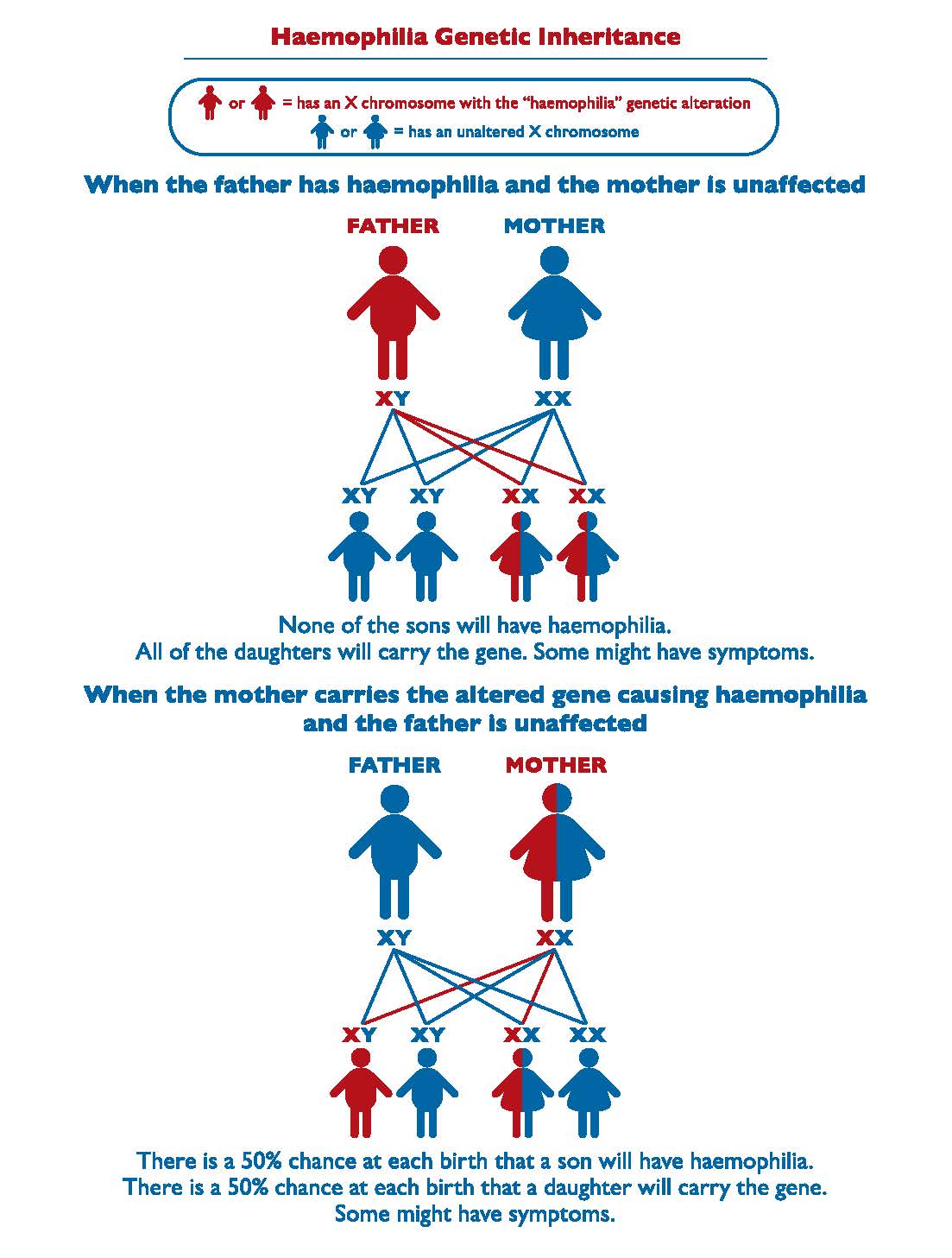Carriers of haemophilia
Information for women from the Haemophilia Centre
What is haemophilia?
Haemophilia is an inherited condition that affects blood clotting; this means it is passed from parent to child through the parents’ genes. The pattern of inheritance is X-linked, which means that generally men are affected by the condition and women are carriers.
There are two types of haemophilia.
Haemophilia A is where the body does not have enough of a clotting factor called Factor VIII.
Haemophilia B is where the body does not have enough of a clotting factor called Factor IX.
How is it inherited?

Women carry two X-chromosomes and men one X-chromosome and one Y-chromosome. The haemophilia gene is carried on the X-chromosome. Mutations can happen, making the gene unable to make enough Factor VIII or Factor IX.
Due to the genetics of haemophilia, any girls who are daughters of men with haemophilia will be carriers (known as obligate carriers). Girls who are daughters of women carriers have a one-in-two chance of being a carrier.
The only way to confirm carrier status is by genetic testing, however, this is generally not done until the age of 16 to make sure that the girl is able to make an informed choice about the test. Genetic testing is available to all women where there is the diagnosis of haemophilia in the family.
What is lyonization?
In each cell in the female body, one of the two X-chromosomes is turned off or suppressed. This happens in all women, not just haemophilia carriers. This process is called lyonization, a random process, the cause of which is not fully understood.
This turned off or suppressed chromosome means that the cell does not make normal amounts of the clotting factor, so blood does not clot properly. However, some haemophilia carriers can have much lower levels of the clotting factor because more of the X-chromosomes with the normal gene are turned off, leaving more of the haemophilia genes.
What are factor levels?
The normal level of Factor VIII for the general population should be 50 to 200 iu/dl or %.
The normal level of Factor IX for the general population should be 60 to 150 iu/dl or %.
Factor levels can vary. Stress, inflammation, infections, pregnancy, and certain medicines can cause Factor VIII levels to go up. Factor IX levels are not affected by these though.
All carriers, both obligate carriers and possible carriers, will have their factor levels checked by a blood test. Having a normal factor level does not exclude you from being a carrier, but knowing your factor level will help us to judge how likely you are to have a bleeding problem.
Are there any symptoms of having a low clotting factor?
Women who are carriers of haemophilia and have low levels of clotting factor can experience bleeding problems.
Common symptoms can be:
nose bleeds
bleeding from gums
easy bruising
bleeding during and / or after surgery
bleeding after trauma / injury
heavy and prolonged bleeding during your period (Menorrhagia).
How is having a low factor level treated?
Day-to-day treatment is not needed for low factor levels; however, treatment may be needed before and after surgery, dentistry, or after trauma.
The need for treatment will depend on:
the severity of your bleeding
the type of surgery or dental treatment you need
your previous bleeding history
your family’s history of bleeding; and
your measured level of Factor VIII or Factor IX.
What do I need to consider when planning a family?
If you have more recently found out you are a haemophilia carrier, when thinking about starting a family or having more children you may have questions and concerns. It is therefore important to discuss the implications of your carrier status and any other concerns you may have with the haemophilia staff at a clinic appointment. We can make you an appointment with the consultant to discuss more fully the possible impact of your carrier status. This will make sure that you and your baby have the best care, as well as any testing that may be available to you before you give birth.
Useful websites
There are a number of web sites available that can also provide you with useful information.